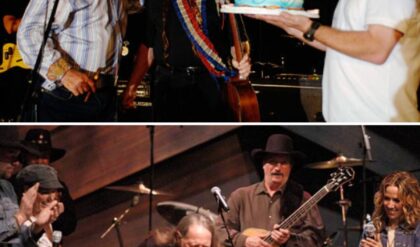On a poignant evening at Nashville’s Grand Ole Opry House, the country music world gathered to honor the life and legacy of Loretta Lynn, the trailblazing icon who passed away on October 4, 2022, at the age of 90. Among the star-studded lineup of performers, Keith Urban stood out, delivering a soul-stirring acoustic rendition of Lynn’s 1971 classic “You’re Lookin’ at Country.” His performance, steeped in raw emotion, was more than a musical tribute—it was a testament to a deep friendship that spanned decades, from award show dates to unforgettable birthday surprises. Reflecting on her impact, Urban wrote, “It’s hard to quantify what she brought not only to country music, but to millions of people everywhere… She did it.” His words encapsulated the essence of a woman who broke barriers, sang from the heart, and inspired generations.
Born Loretta Webb on April 14, 1932, in Butcher Hollow, Kentucky, Lynn rose from humble beginnings to become one of country music’s most celebrated figures. Her journey began in poverty, in a small cabin surrounded by the Appalachian hills, where her father worked as a coal miner. Married at 15 to Oliver “Doolittle” Lynn and a mother of four by 19, she taught herself to play a $17 guitar and began writing songs that captured the grit and grace of everyday life. Her debut single, “I’m a Honky Tonk Girl,” released in 1960, climbed to No. 14 on the Billboard country chart, earning her a spot on the Grand Ole Opry stage that October. By 1962, she was an official Opry member, a milestone she once called “the greatest moment of my life.”
Lynn’s music was fearless, tackling topics like love, infidelity, and women’s empowerment with unapologetic honesty. Hits like “Don’t Come Home A-Drinkin’ (With Lovin’ on Your Mind),” “Fist City,” and “The Pill” gave voice to women in a male-dominated industry, resonating with fans who saw their own struggles in her lyrics. Her 1970 autobiographical anthem “Coal Miner’s Daughter” became her signature, later inspiring an Oscar-winning film starring Sissy Spacek. Over her six-decade career, Lynn amassed 51 Top 10 hits, 16 No. 1 singles, three Grammy Awards, and eight Country Music Association Awards, including becoming the first woman to win CMA Entertainer of the Year in 1972. Her induction into the Country Music Hall of Fame in 1988 and the Presidential Medal of Freedom in 2013 cemented her as a cultural icon.
The memorial service, held on October 30, 2022, and dubbed “Coal Miner’s Daughter: A Celebration of the Life & Music of Loretta Lynn,” was a fitting tribute to her monumental legacy. Hosted by NBC’s Jenna Bush Hager, a close family friend, the event drew a packed house of 1,500 fans, some of whom lined up at 4 a.m. to secure tickets. The evening featured performances from artists like Alan Jackson, George Strait, Tanya Tucker, and The Highwomen, alongside video tributes from Dolly Parton and Taylor Swift. Yet, it was Keith Urban’s performance that captured hearts, blending musical reverence with personal connection.
Urban, a four-time Grammy winner and Opry member, took the stage with a six-string banjo, infusing “You’re Lookin’ at Country” with an extra dose of twang. The 1971 hit, a proud declaration of Lynn’s rural roots, came alive in his hands, its simple melody carrying the weight of her legacy. His acoustic rendition stripped the song to its core, letting Lynn’s words shine: “I’m about as old-fashioned as I can be / And I hope you’re likin’ what you see.” The crowd, already emotional, erupted in applause, many wiping away tears as Urban’s voice echoed Lynn’s trademark sincerity.
Their bond, which Urban reflected on during the tribute, began years earlier and blossomed into a friendship marked by mutual respect and playful moments. In 2005, Lynn invited Urban to be her “date” at the CMT Music Awards, a gesture that showcased her warmth and humor. “She was always so genuine,” Urban recalled, sharing how she made him feel like family. Their connection deepened in 2018 at Lynn’s 87th birthday celebration, a star-studded concert at Nashville’s Bridgestone Arena. Lynn, ever the mischief-maker, had jokingly demanded Urban pop out of a cake for the event. He obliged, emerging to cheers and later sharing a now-iconic voicemail from Lynn: “Hey, Keith, this is Loretta, and I’m having a birthday, and I want to see your butt there.” Urban played the message for the memorial audience, drawing laughter and tears—a perfect encapsulation of Lynn’s wit and heart.
Urban’s tribute wasn’t just about their personal connection; it was a nod to Lynn’s broader impact. “It’s hard to quantify what she brought not only to country music, but to millions of people everywhere,” he wrote. “She did it.” Those words summed up Lynn’s ability to transcend genre, connecting with fans across generations and backgrounds. Her songs, often autobiographical, spoke to universal truths—love, resilience, and standing up for oneself. She paved the way for female artists like Miranda Lambert and Carly Pearce, who have cited her as a guiding light. Lambert, who performed with Lynn at the 2010 tribute album Coal Miner’s Daughter: A Tribute to Loretta Lynn, once said, “Loretta always just said exactly what she was going through, and that’s why it resonates with us.”
The memorial was filled with other unforgettable moments. Alan Jackson performed “Where Her Heart Has Always Been,” a song he wrote for his late mother, with permission from Lynn’s family, noting how Lynn reminded him of her. George Strait honored her with “Don’t Come Home A-Drinkin’,” while Tanya Tucker delivered a soulful “Blue Kentucky Girl,” a song tied to Lynn’s roots. Jack White, who produced Lynn’s Grammy-winning 2004 album Van Lear Rose, surprised the audience with “Whispering Sea,” one of Lynn’s earliest compositions. The night closed with The Highwomen—Brandi Carlile, Natalie Hemby, Amanda Shires, and Brittany Spencer—performing “Coal Miner’s Daughter,” a fitting finale that brought the crowd to its feet.
Beyond the music, the memorial highlighted Lynn’s role as a mentor and friend. Artists like Reba McEntire, who once said, “When Loretta calls, we all come running,” spoke of her generosity. Lynn’s friendship with Patsy Cline, who helped her navigate Nashville’s early challenges, was a recurring theme. Sissy Spacek, who became close to Lynn during the filming of Coal Miner’s Daughter, recalled being “thunderstruck” by her authenticity. Taylor Swift, in a video tribute, praised Lynn’s “truthful, fearless honesty” as a songwriter, particularly for women.
Lynn’s influence extended beyond music. Her 1976 autobiography, Coal Miner’s Daughter, spent weeks on The New York Times bestseller list, and her Hurricane Mills ranch in Tennessee became a pilgrimage site for fans. She championed causes close to her heart, like the 1971 charity concert in Louisville for families of coal miners killed in a 1970 explosion. Even in her later years, after a stroke in 2017 and a hip injury in 2018, she remained active, releasing her 50th studio album, Still Woman Enough, in 2021. The album, featuring collaborations with female artists, celebrated her enduring commitment to empowering women in country music.
Urban’s tribute, though, stood out for its intimacy. His performance was not just a nod to Lynn’s catalog but a reflection of their shared history. From their lighthearted moments—like Lynn cooking him chicken and dumplings at her ranch—to their professional admiration, Urban embodied the spirit of a woman who never backed down. His words, “She did it,” were a reminder of Lynn’s tenacity, from sleeping in a car outside the Opry in 1960 to becoming a global icon. As he strummed the final chords of “You’re Lookin’ at Country,” the audience felt the weight of her absence but also the vibrancy of her legacy.
The memorial, broadcast live on CMT and SiriusXM, was a celebration of a life well-lived. Lynn’s family, including daughter Patsy Lynn Russell and granddaughter Tayla Lynn, took the stage to express gratitude for her impact. “She was the godmother of country music,” one fan told reporters, echoing the sentiment of many. For Urban, the night was a chance to honor a friend who shaped his own path in Nashville. As he left the stage, he tipped his hat—a gesture Lynn would have loved—knowing her music and spirit would live on in the Opry’s hallowed halls and beyond.




